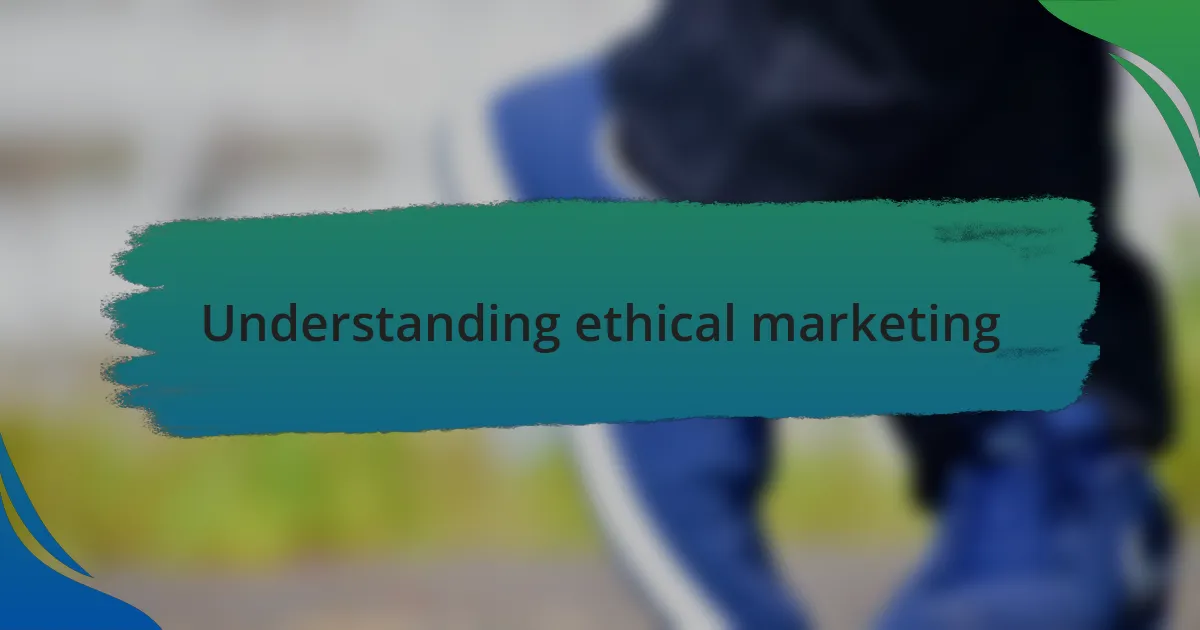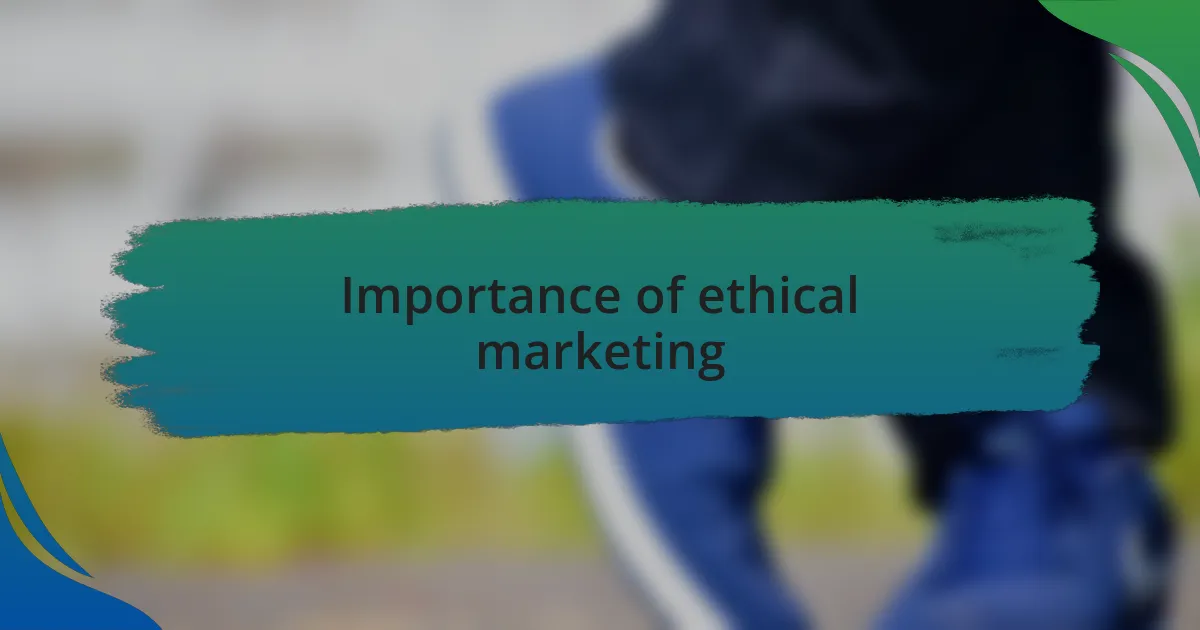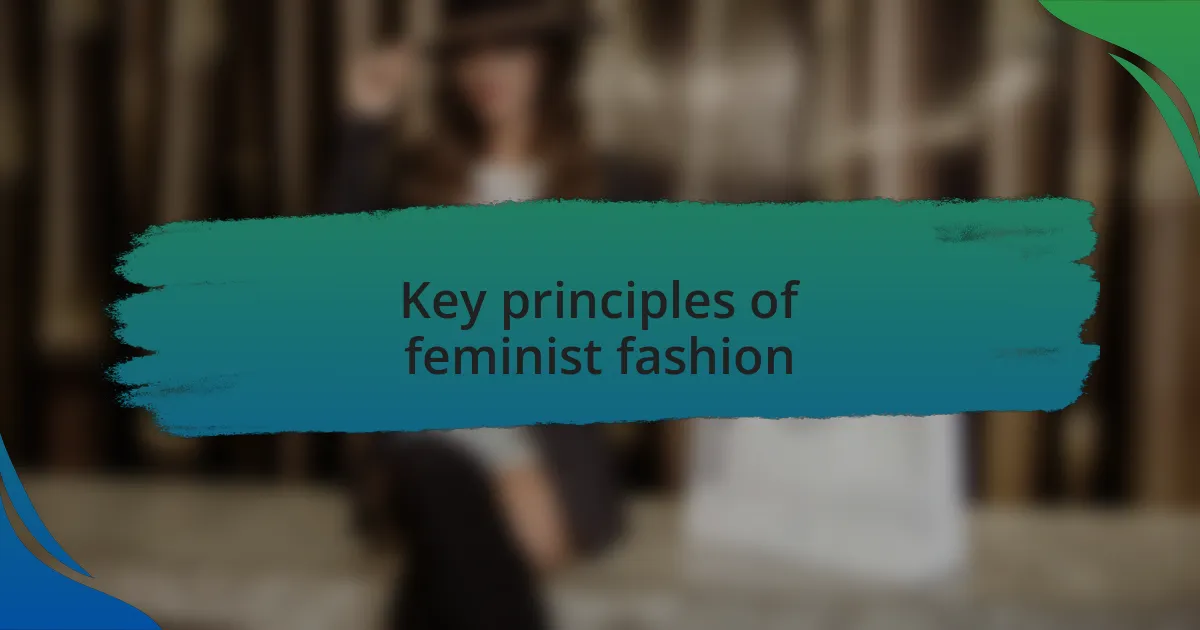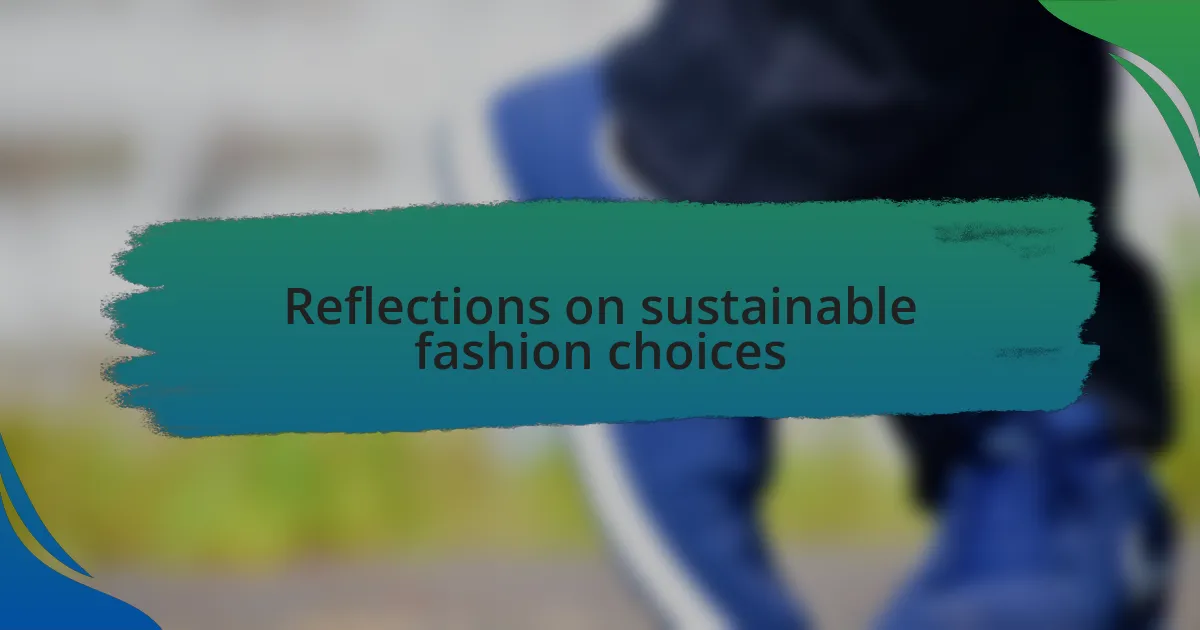Key takeaways:
- Ethical marketing emphasizes transparency and responsibility, fostering genuine connections between brands and consumers.
- Feminist fashion promotes inclusivity, challenging traditional beauty standards while empowering diverse voices.
- Consumers gain agency and awareness through ethical marketing, enabling informed purchasing decisions that align with their values.
- Personal experiences with ethical brands highlight the meaningful stories behind purchases, enriching the shopping experience beyond mere transactions.

Understanding ethical marketing
Ethical marketing revolves around promoting products in a way that is honest and considerate, prioritizing transparency over manipulation. I remember my first experience with a brand that made a real effort to highlight their sustainable practices; it sparked a deeper connection for me. Have you ever felt that shift when you realize a brand truly cares about its impact on the world?
At its core, ethical marketing challenges the status quo by emphasizing responsibility, not just profitability. When I see brands openly share their sourcing processes and labor practices, I can’t help but feel more inclined to support them. Does knowing the story behind the clothes you wear shift your relationship with them? It certainly does for me.
Moreover, ethical marketing encourages a more inclusive narrative that celebrates diverse voices and perspectives. For instance, when a fashion line features models of different sizes or ethnic backgrounds and lets their journeys be heard, it transcends mere aesthetics for me; it resonates on a much personal level. How does it make you feel when a brand aligns itself with values that mirror your own?

Importance of ethical marketing
Ethical marketing plays a pivotal role in fostering genuine connections between brands and consumers. I recall feeling a rush of excitement when I discovered a small label committed to fair trade practices, knowing that my purchase was contributing to a healthier community. Have you ever bought something and felt proud not just of the item itself, but of what your choice represented?
A commitment to ethical marketing also drives innovation and positive change within the fashion industry. I’ve noticed that brands prioritizing ethical practices often lead the way in sustainability, inspiring others to adapt and improve their methods. Doesn’t it feel rewarding to support businesses that push the boundaries of traditional marketing by doing the right thing?
Furthermore, ethical marketing empowers consumers to make informed decisions, paving the way for a more conscious shopping experience. The last time I researched a brand’s environmental impact, it opened my eyes to the hidden costs behind fast fashion. Isn’t it enlightening to realize that with every purchase, we can amplify voices advocating for justice and equality?

Key principles of feminist fashion
Feminist fashion is anchored in inclusivity, ensuring that women of all backgrounds and body types can find styles that resonate with them. I remember visiting a pop-up shop that showcased clothing designed by women from marginalized communities. It felt refreshing to see fashion that not only celebrated diversity but also empowered those who created it. Have you ever worn something that felt like it truly represented who you are?
Another key principle is the embrace of transparency in the supply chain. When brands openly share where and how their products are made, it builds trust with consumers. I’ve felt a real sense of connection when I learned about the artisans behind a piece of clothing I purchased, knowing their stories and struggles. Don’t you think that understanding the journey of a garment makes wearing it that much more meaningful?
Lastly, feminist fashion actively challenges traditional beauty standards and gender norms. It’s captivating to see how some brands incorporate art and activism into their designs, pushing boundaries and encouraging self-expression. I often reflect on how wearing unconventional styles has allowed me to express my identity more freely. Doesn’t it feel empowering to wear what you love, regardless of societal expectations?

How ethical marketing benefits consumers
When ethical marketing is at play, consumers are empowered to make choices that align with their values. I remember discovering a brand that sourced materials sustainably and paid fair wages to workers. It felt incredible to know that my purchase wasn’t just a transaction but a contribution to a bigger, positive impact. Isn’t it rewarding to support a company that prioritizes ethics over profit?
Moreover, ethical marketing fosters deeper relationships between brands and consumers. I often find myself returning to companies that share the stories behind their products, and it transforms my shopping experience into a personal connection. It’s as if I’m not just buying clothing; I’m investing in a community and its mission. Have you ever felt that buzz of excitement when a brand resonates so closely with your beliefs?
Importantly, the transparency that comes with ethical marketing cultivates informed consumers. I’ve learned to ask questions about sourcing and production processes when shopping, which has changed how I engage with fashion. This awareness leads to more responsible choices, shifting the industry toward practices that respect both people and the planet. Don’t you think that being a conscious consumer brings a sense of agency in a world filled with fast fashion?

Personal experiences with ethical brands
I remember my first purchase from an ethical clothing brand. It was a simple dress, but when it arrived, it came with a note from the artisan who made it, sharing her story. That personal connection made me realize how meaningful it is to support a brand that values its workers. Have you ever felt that surge of joy knowing your purchase has a positive story behind it?
On another occasion, I attended a pop-up shop featuring local ethical brands. While browsing, I met the founder who passionately explained their commitment to sustainable materials and fair trade. It wasn’t just about selling clothes; it was about community and shared values. That experience made me reflect on how much more enriching shopping can be when you know the heart behind the brand. Isn’t that a refreshing change from the usual retail experience?
Lastly, I’ve noticed how ethical brands often encourage dialogue around their practices. I engaged in a social media discussion about one brand’s impact on the environment, which opened my eyes to the complexities of sustainable fashion. This kind of involvement reminds me that when we choose ethical brands, we’re not just consumers; we’re participants in a larger movement toward responsibility and awareness. How empowering is it to feel like one person can ignite change with their purchasing choices?

Reflections on sustainable fashion choices
I often find myself reflecting on the impact of my wardrobe choices. When I decided to switch to sustainable fashion, it felt like shedding an old skin. Each piece I now own tells a story, highlighting the artisans behind the designs. It’s refreshing to think that my attire can express not only my style but also my values.
The other day, while organizing my closet, I stumbled upon a shirt made from organic cotton. I couldn’t help but appreciate the thoughtfulness behind it—the reduced environmental footprint and the fair wages for those who made it. It made me wonder: how many fast-fashion items did I buy in the past that lacked a story or a purpose? That realization brought a sense of responsibility along with pride.
I also remember a conversation I had with a friend who was skeptical about the higher prices of ethical clothing. I explained how the initial cost reflects the quality and the sustainable processes involved. It struck me that investing in such pieces not only fosters a deeper relationship with the clothes I wear but also supports a future built on conscious consumerism. How amazing is it that each purchase can be a step toward a more just and sustainable future?